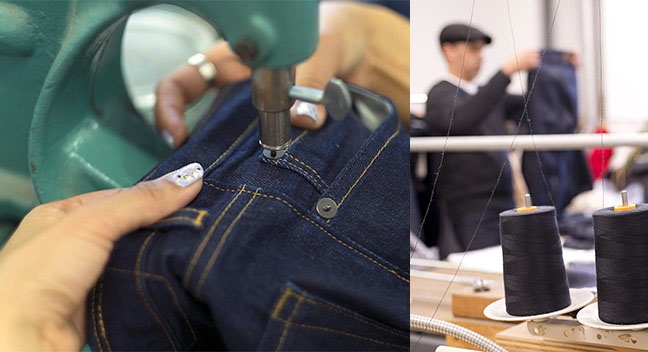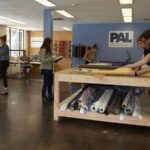Shuttering of algorithm-based jeans company is a cautionary tale for Portland makers.
Crystal Beasley, a veteran Mozilla product developer, had two ideas when she launched her apparel company QCut in 2014: give women jeans in 400 sizes rather than the measly 10 to 20 sizes most brands carry, and overhaul an apparel manufacturing industry that is geared to fast fashion and offshore production and immune to technological innovation.
Beasley succeeded, at least partially, in her first goal. QCut garnered massive media love, easily surpassed its $75,000 initial Kickstarter funding goal and had 728 backers, most of whom were women eager to receive a pair of the celebrated near-custom jeans.
But Beasley ran into the tribulations of new, non-technology entrepreneurs who want to move beyond ‘maker’ status — that is, a weak funding environment and little existing infrastructure support.
Last week, QCut had to close its Southwest Portland pop-up jeans fitting shop, and Beasley will notify her outstanding Kickstarter customers today that company operations will cease due to lack of funding.
 “I’ve got a classic problem,” Beasley said. “The costs at the scale I’m at are so much more than the costs for the pair of jeans you can go down to the mall and get.”
“I’ve got a classic problem,” Beasley said. “The costs at the scale I’m at are so much more than the costs for the pair of jeans you can go down to the mall and get.”
Beasley was direct selling QCut jeans for $235 with a many-weeks turnaround time.
The company’s unique solution to the jeans-fitting problem so many women — and men — face is a proprietary sizing algorithm developed by Gerald Ruderman, formerly a QCut partner.
The algorithm allows a jeans-loving customer to input height, weight, shoe size, bra size, along with the size and brand name of their most-treasured pair of existing jeans, to create a custom product without the requirement for an in-person meeting.
Instead, QCut mailed trial jeans to customers based on the algorithm’s recommendation. Customers opened their jeans and lived happily ever after or sent them back for additional adjustment or cuff hemming.
Beasley’s Kickstarter earnings allowed her to get operations going, including working with different Los Angeles-based manufacturers to sew the finished jeans, which are all made from a dark, Italian-made denim.
Because every jean is basically different, especially once a customer has pinned for cuff length they want, finding manufacturing partners has been trying, Beasley said.
“Manufacturers weren’t dialing in the type of quality tolerances we wanted – we’ve had to do a lot of troubleshooting.”
Beasley longed to set up or encourage local lean manufacturing with QCut as a primary customer, and was looking to find roughly US $2 million to push that idea forward, but the dream foundered when she failed to get capital investors.
“Nobody in the Portland funding scene was willing to make that kind of investment,” she said.
That doesn’t surprise Jasmine Agnor, marketing communications manager at the Oregon Manufacturing Extension Partnership based in Portland.
“Portland is just starting to address the needs of apparel makers,” Agnor said, “but it’s definitely more difficult to build a physical product, with multiple supply chains than it is, to say, create a piece of software.”
Investor bias toward tech startups and the paucity of a ‘business ecosystem’ for apparel and fashion entrepreneurs are reasons Dawn Moothart founded the Portland Apparel Lab (PAL), a maker’s space and business accelerator in 2014.
PAL has languished in the past year, and Moothart is getting ready to put up its own Kickstarter this weekend for a new collaborative workspace in partnership with the city’s fabrication lab ADX.
PAL at ADX, as Moothart says the new space will be called, will focus on early-stage companies at a smaller size than QCut. But she said going from startup to a medium-sized, mature business is also challenging.
“It’s true that it’s difficult for middle-stage business to go to the next level. There’s a hump there, and fundraising is tough if you are in apparel/fashion,” she said.
Moothart especially mourns the loss of QCut, as she had just returned her own QCut custom jeans due to a stretching issue, and now wonders if she’ll get to receive a finished pair.
“When I first put on the jeans it was ‘Oh my god, there’s no gap in the back,’” she said. “They just fit well everywhere.”
All four of the employees at the QCut pop-up were laid off on Friday, and Beasley said Thursday would likely result in the worst-case scenario for her and partner Karen Ertmann (former CEO of Animation Dynamics): having to lay off the rest of the small staff.
Beasley said her next step is to try to sell the QCut algorithm and production system to an established apparel or manufacturing company.





